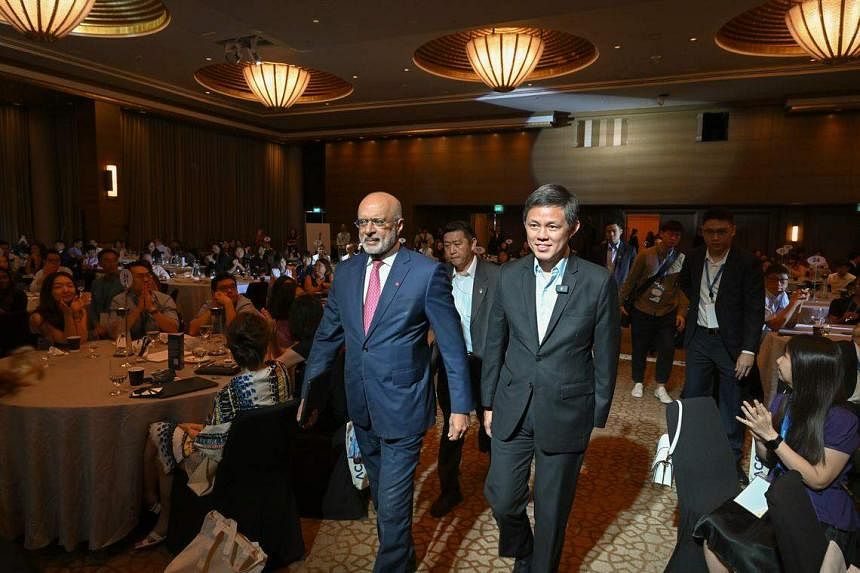SINGAPORE – Uplifting those who are less privileged will take more than sharing financial resources – it will also involve sharing of networks and opportunities, said Education Minister Chan Chun Sing.
This is how Singapore can sustain the system of meritocracy, where those who succeed because of the system pay it forward, he added.
“This will be the type of meritocracy with Singaporean characteristics that we would like to see,” said Mr Chan, who was discussing the topic of social mobility with chief executive of DBS Group Piyush Gupta on April 5.
He was speaking to about 450 guests at the Access Social Mobility Summit at the Ritz-Carlton, Millenia Singapore. The event marked the fifth anniversary of Access Singapore, a social mobility charity founded in 2019 that aims to provide career exposure opportunities for disadvantaged students in Singapore.
The summit featured several panel discussions on the challenges and opportunities of ensuring social mobility in Singapore.
A meritocracy with Singaporean characteristics starts with ensuring that dimensions of merit are not overly narrow, said Mr Chan.
“Different people develop different strengths and abilities, and are able to make different contributions in different life stages,” he said.
“We are a hyperconnected society now, not just internally in Singapore, but also with the rest of the world, and that sense of comparison is becoming much more (in your face) than ever before,” Mr Chan said.
He was responding to Mr Gupta’s question about Singaporeans’ perception of increasing inequality despite a decrease in the country’s Gini coefficient, a measure of inequality on a scale of 0 to 1, where higher values indicate higher inequality.
In February 2024, it was reported that the Gini coefficient based on household income from work per household member fell to 0.433 in 2023 from 0.437 in 2022.
The vast majority of Singapore’s population has achieved absolute mobility, Mr Chan said, citing the education system as an example, where the bottom 25 per cent of students by socio-economic status perform better than the Organisation for Economic Cooperation and Development’s average.
“Our challenge is that our people have such high averages, but they don’t feel that they are catching up,” he said, and they end up criticising themselves for the gap.
“The gap is not because the people are falling behind. The gap is more because those at the top are going even faster,” he said. “But then, how do we reconcile this whereby it’s not just the absolute that matters?”
This is where sharing of resources comes in, where it is not just about rendering financial help but also ensuring access to opportunities and networks, Mr Chan said.
Panellists at the event spoke about the state of social mobility in Singapore, and how stakeholders like businesses and philanthropists play a part in advancing the cause.

Key to advancing social mobility is a deeper collective shift in mindsets to look beyond just grades, said Mr Zhuo Gangwei, director of socio-economic policy and policy analytics at the Prime Minister’s Office, who was one of 17 panellists at the summit.
It is also about respecting and seeing people for who they are, instead of defining them by competition or their accomplishments, said Associate Professor Vincent Chua of the Department of Sociology and Anthropology at the National University of Singapore.
There is still some way to go, said founder and executive director of Access Singapore Clarence Ching, as some in Singapore are still left behind, with differing academic strengths and varying familial backgrounds that contribute to this disparity.
“Opportunities should not be dictated by one’s socio-economic status,” he said, calling for more research to be done within the local social mobility scene, so that there is a deeper understanding of challenges for more effective intervention.
Increased focus on youth interventions and promoting diverse pathways to success, among several factors, are also key to tackling the social mobility challenges faced in Singapore, he added.
Total equality may never be achieved, said Mr Chan, but individuals should always try to surpass themselves.
“Everyone in Singapore must have a sense of hope that they can do better for themselves,” he said, adding that the notion of self-improvement is a more effective approach to addressing social mobility than merely striving for equality.
“But what is definitely achievable is that regardless of our background, you can have hope for a better life in Singapore.”


